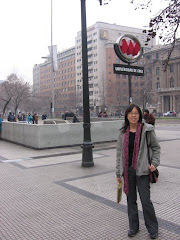One of the most interesting things about living in Trujillo has been realizing how similar it is to New York City. Sure it's only got about 1/8 the population, and the cost of living is far lower than that in the financial capital of the world. But both are globalized 21st century cities with similar "types" of people - migrants from the hinterlands, inner cities with urban decay, upwardly mobile students and young professionals, and a few wealthy /social /cultural elite.
Both cities are strongly liberal (for many of the reasons listed above), but also places where everybody is chasing money and social advancement. Here, as in New York, upper-middle class kids wear Che T-shirts, listen to punk rock, and talk about Communism while enjoying their new cellphones. Meanwhile in the poorer "outer boroughs", foreign and domestic do-gooders start microfinance programs or tutoring centers to try to even out the enormous economic disparity.
In much of Peru, people still live a traditional lifestyle of subsistence farming or trade, much like they have lived for centuries; however the people who come to Lima or Trujillo are the modern ones, the Peruvians who want digital cameras and degrees in computer engineering. They are just as excited about networking sites like Facebook (the big one here is Hi5), and as worried about China and India, as Americans. They are not so different from the young people streaming into New York City from all over the country to have some excitement and job opportunity. Meanwhile, the native-born New Yorkers/Trujillanos watch in amazement (and pride) as their cities grow and transform at breakneck speed with the influx of newcomers, commerce and technology.
Of course Peru is a lot less developed than the States, and unfortunately a lot fewer people are actually finding jobs and opportunities for advancement. But the pace of change is just as fast, if not faster. It's been cool working with both the marginalized ghetto-type areas and the center-city students / young professionals. As a New Yorker, I feel surprisingly at home. If I were in the countryside on the other hand, I would probably be completely out of my element.

rural "campesinos" - not like New York

my sister with street kids in Lima - not so different from the Lower East Side

university students/young professionals in Trujillo - not so different from the NYU/Columbia demographic, or yuppies in Manhattan...
